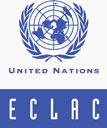At a symposium convened by the UN Economic Commission for Latin America and the Caribbean's (ECLAC) Subregional Headquarters for the Caribbean, participants identified 12 of the 17 proposed Sustainable Development Goals (SDGs) as priorities for addressing the region's sustainable development needs.
Participants also discussed the development of a regional SDG framework, which they said must recognize medium-term challenges facing the region and potential opportunities over the long term.
 26 June 2015: At a symposium convened by the UN Economic Commission for Latin America and the Caribbean’s (ECLAC) Subregional Headquarters for the Caribbean, participants identified 12 of the 17 proposed Sustainable Development Goals (SDGs) as priorities for addressing the region’s sustainable development needs. Participants also discussed the development of a regional SDG framework, which they said must recognize medium-term challenges facing the region and potential opportunities over the long term.
26 June 2015: At a symposium convened by the UN Economic Commission for Latin America and the Caribbean’s (ECLAC) Subregional Headquarters for the Caribbean, participants identified 12 of the 17 proposed Sustainable Development Goals (SDGs) as priorities for addressing the region’s sustainable development needs. Participants also discussed the development of a regional SDG framework, which they said must recognize medium-term challenges facing the region and potential opportunities over the long term.
The ‘Symposium on Sustainable Development Goals (SDGs) for the Caribbean within the post-2015 Development Agenda’ brought together ministers and senior policymakers in the fields of planning and development, environment and social affairs, as well as academics, civil society and representatives of the UN and the Caribbean Community (CARICOM). Convened with support from the Caribbean Development Bank, the symposium took place on 24-25 June 2015, in Port of Spain, Trinidad and Tobago.
Diane Quarless, Director, ECLAC Subregional Headquarters for the Caribbean, said the region must take the SDGs and “make them our own.” Arnaldo Brown, Jamaica’s Minister of Foreign Affairs and Foreign Trade, pointed to critical areas of importance for the region, including vulnerability to natural hazards, high indebtedness faced by many Caribbean countries, youth unemployment and a high crime rate.
The SDGs identified as priorities for the Caribbean are: SDG 2 (ending hunger, achieving food security and improving nutrition, and promoting sustainable agriculture); SDG 3 (ensuring healthy lives and promoting wellbeing); SDG 4 (ensuring inclusive and equitable quality education and promoting lifelong learning opportunities); SDG 5 (achieving gender equality and empowering women and girls); SDG 7 (ensuring access to affordable, reliable, sustainable and modern energy for all); SDG 8 (promoting sustained, inclusive and sustainable economic growth, full and productive employment, and decent work for all); SDG 9 (building resilient infrastructure, promoting inclusive and sustainable industrialization, and fostering innovation); SDG 10 (reducing inequality within and among countries); SDG 13 (taking urgent action to combat climate change and its impacts); SDG 14 (conserving and sustainably using the oceans, seas and marine resources); SDG 16 (promoting peaceful and inclusive societies, providing access to justice, and building effective, accountable and inclusive institutions at all levels); and SDG 17 (strengthening means of implementation and revitalizing the global partnership for sustainable development).
While most Caribbean countries are categorized as middle income (MICs), significant pockets of poverty exist, it was noted. Much discussion revolved around the fact that the proposed poverty reduction goal (SDG 1) was not included among the region’s priority SDGs. Participants also emphasized implementing the goals in an integrated manner, rather than as discrete objectives.
Discussions also highlighted: challenges faced by Caribbean countries in pursuing sustainable development; aspects of the region’s development strategy as it transitions from the Millennium Development Goals (MDGs) to the SDGs; the rationale for selecting priority goals; financing the implementation of SDGs in the region; and enhancing institutional infrastructure and governance for implementing, monitoring progress and achieving the Goals.
On financing and implementation, participants considered: immediate and medium-term constraints facing the region; resource gaps that need to be filled by both domestic and international sources; strategies and opportunities related to financing for development; and data and institutional capacity needs. Participants emphasized the critical role of domestic finance in funding and fostering sustainable development, and the need to develop innovative financing mechanisms given the limits of traditional sources. To stimulate domestic finance, they recommended: strengthening taxation systems; enhancing investment in expert management of finance institutions; strengthening public procurement systems; and better leveraging resources from credit unions and national and regional development banks.
They also discussed innovative mechanisms such as: public-private partnerships (PPPs); guarantees; credit swaps, green financing and results-based financing; and blended financing mechanisms. The important role of partnerships was emphasized, specifically strengthening global partnerships for development in the region. [ECLAC Press Release] [Symposium Website] [IISD RS Sources]